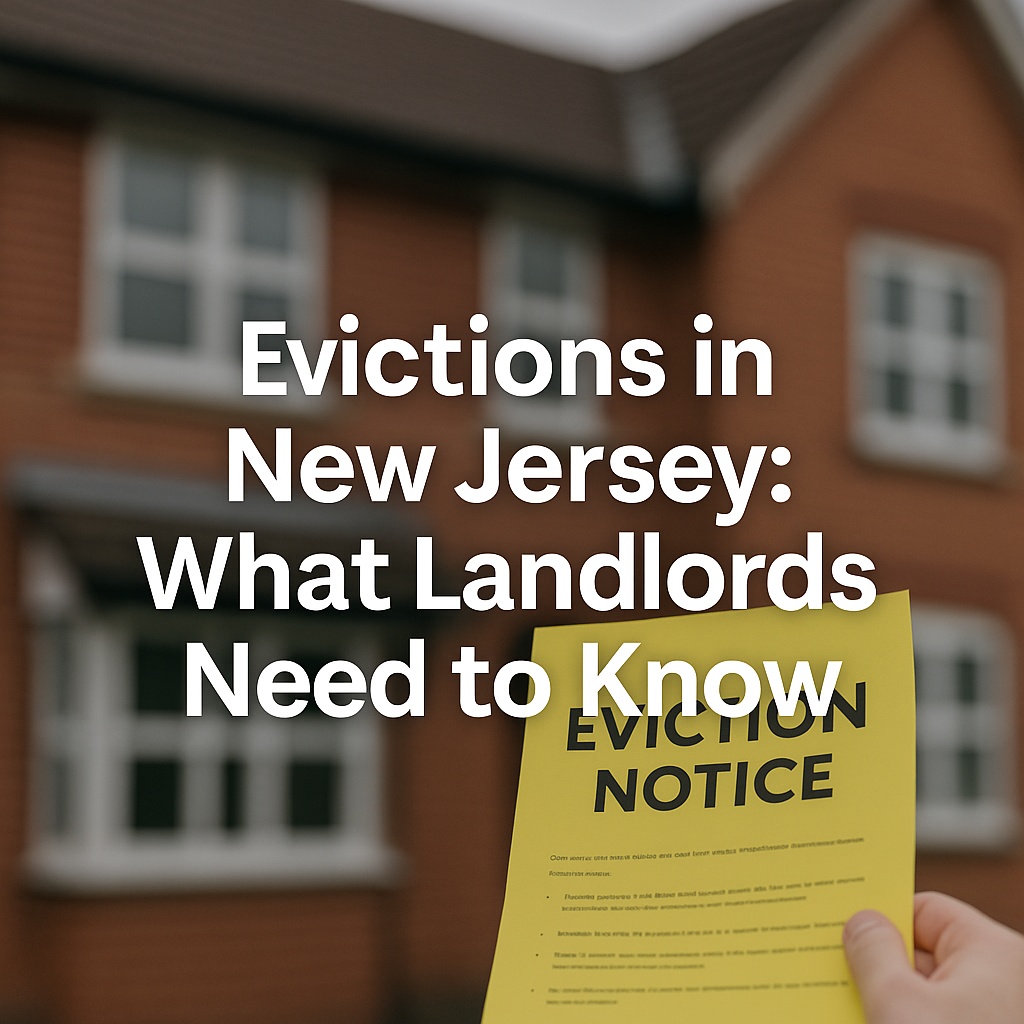Evictions in New Jersey: What Landlords Need to Know
New Jersey’s eviction process is tightly regulated and must be handled through the courts. Landlords must follow specific notice, filing, and timing rules — and self-help actions such as changing locks or shutting off utilities are strictly prohibited.
1) No Self-Help Allowed — Ever
Evictions in New Jersey are court-supervised only. Landlords may not lock out tenants, remove belongings, or shut off essential services without a judgment for possession and a warrant for removal. Violating these laws can lead to penalties or lawsuits. Always proceed through the court system as outlined by the New Jersey Courts.
2) Legal Grounds for Eviction (“Good Cause”)
Under the state’s Anti-Eviction Act, landlords must have a valid reason—called “good cause”—to remove most tenants. The most common grounds include:
- Nonpayment of rent: Tenant fails to pay rent when due.
- Habitual late payment: Repeatedly paying rent late, even after warnings.
- Serious lease violations: Unauthorized occupants, pets, or illegal subletting.
- Damage or nuisance: Tenant causes property damage or disturbs other residents.
- Illegal activity: Drug-related offenses or other criminal acts on the premises.
- Owner or family occupancy: Landlord seeks possession for personal or immediate family use (specific conditions apply).
- Conversion or retirement: Property is being permanently removed from residential use or converted to condos.
Most landlords are covered under the Anti-Eviction Act, though certain owner-occupied properties (with two or fewer rental units) may be exempt. When in doubt, consult the NJ Truth in Renting Guide (PDF) from the Department of Community Affairs (DCA).
3) Notice Requirements
Each eviction type has its own notice requirements. Using the wrong notice—or failing to serve it properly—will almost always result in dismissal.
- Nonpayment of rent: No formal notice is required if the lease specifies a due date, but a written demand is recommended.
- Habitual late payment or violations: Serve a “Notice to Cease” first, warning the tenant to stop the behavior. If it continues, issue a “Notice to Quit and Demand for Possession.”
- Property damage or nuisance: Usually requires only a “Notice to Quit.”
- Owner occupancy or conversion: Requires longer notice periods (often 60–90 days) and may require relocation assistance.
All notices should include the tenant’s name, address, specific reason for eviction, and be delivered by hand or certified mail. Sample forms and guidelines are available from the NJ Courts Landlord–Tenant Self-Help Center.
4) Filing the Complaint
If the tenant fails to comply after notice, the landlord must file a complaint in the Special Civil Part, Landlord–Tenant Section of the county court where the property is located.
- Documents needed: Lease, ledger, copies of notices, and proof of delivery.
- Filing fees: Generally between $50 and $75 (varies by county).
- Scheduling: The court assigns a hearing date, usually within a few weeks of filing.
At the hearing, both parties can present evidence. Tenants may raise defenses such as improper notice or uninhabitable conditions. If the landlord prevails, the court enters a Judgment for Possession.
5) Warrant for Removal & Lockout Process
Once a judgment is entered, the court issues a Warrant for Removal, which authorizes a court officer to evict the tenant. Only an official court officer or constable can perform the lockout—never the landlord. Tenants generally have three business days after service of the warrant to vacate before the officer returns to complete the eviction.
6) After the Eviction
- Personal belongings: Tenants may retrieve personal items within a set period under the Abandoned Property rules.
- Security deposit: Must be returned or itemized within 30 days after possession is regained, per NJ law.
- Property turnover: Document post-eviction condition and perform necessary repairs before re-renting.
7) Eviction Moratoria and Hardship Programs
During emergencies (such as the COVID-19 pandemic), New Jersey has implemented temporary eviction moratoria and hardship assistance programs. Before filing, check for any active restrictions or rental relief programs on the NJ Department of Community Affairs website.
8) Tips for Landlords
- Keep detailed records of payments, notices, and communications.
- Serve all notices correctly and maintain proof of delivery.
- Ensure your property is habitable and up to code—judges often ask about repairs.
- Be professional and respectful in court; arrive early and organized.
9) Helpful Resources
- NJ Courts – Landlord–Tenant Self-Help Center
- NJ DCA – Truth in Renting Guide (PDF)
- NJ Department of Community Affairs (DCA)
Example: For a nonpayment eviction, double-check the rent balance, exclude any disputed or improper fees, and document every communication. Bring copies of the lease, ledger, payment history, and notices to court.
Tip: Use standardized notice templates and a written checklist for each step. Consistency and documentation are your strongest defenses in landlord–tenant court.
Disclaimer: This content is provided for informational purposes only and does not constitute legal advice. Always verify current procedures with the New Jersey Courts or a qualified attorney before filing an eviction.

